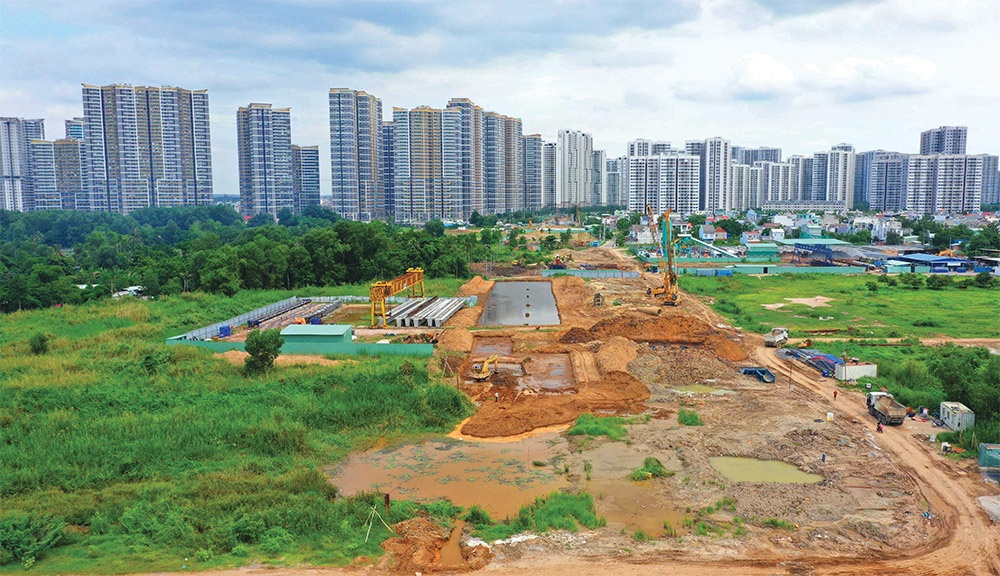Rules now clearer for extension of land use
The new Land Law, effective from August, along with the new Law on Investment that took effect in 2021, introduced significant changes to the regulations established by the 2013 Land Law.
 |
| DFDL Vietnam’s partner and co-managing director Hanh Tran, and senior legal advisor Nguyen Bao Ngoc |
Among the notable changes are the rules on the extension or adjustment of land use term with clearer criteria, which could have a considerable impact on foreign investors using land in Vietnam. More detailed guidance on implementation of the law was issued earlier this year.
The laws of 2013 and 2024 permit local and foreign investors to apply for an extension when the land use term is nearing expiration (i.e., six months before the term ends). However, the 2013 law did not set out any criteria for the authorities to consider and make a decision on the extension of land use term.
This made financiers uncertain as to how their application for the extension of land use term would be considered and whether such application would be approved. Foreign investors were even more unsecured due to such ambiguity, since their interests under the 2013 law were more limited than those of local ones.
The new Land Law, along with the new Law on Investment, has effectively clarified the criteria required for those seeking to extend the land use term.
Under the new law, the extension of land use term can be applied in two scenarios: one is when the term nearly expires, which is referred to as an extension, and the other is when the investor seeks to increase the term, which is referred to as an adjustment of land use term and could be proceeded at any time during the term.
Extension and adjustments
To apply for the extension when the land use term nearly expires, an investor must first obtain approval for a project term extension from the authority. Under the Law on Investment 2020, as further guided by Decree No.31/2021/ND-CP, regarding a project using land, the authority will consider and decide on the extension of project term if the conditions for planning and the conditions for land allocation or lease are satisfied.
For planning conditions, the investors must ensure conformity to the national, regional, provincial, and urban planning, as well as any special administrative-economic unit planning (if applicable), and alignment with the objectives and orientations for urban development or residential housing development plans and programmes, particularly for residential housing and urban area construction projects.
For conditions for land allocation or lease, the new Land Law requires investors to satisfy the following conditions: pay a deposit or provide other securities according to laws; have the financial capacity to ensure land use according to the project schedule and other relevant requirements; and not violate laws.
If there are violations, the land user must have fully complied with the effective decisions or judgments of the competent authority at the time of applying for allocation, lease, or repurposing. The determination of violations encompasses all parcels used by land users nationwide.
The investment authority would seek comments from the relevant authorities in order to consider the application for an extension of the project term. After the approval on the project term extension is issued by the authority, it must be attached to the application dossier submitted to the land authority for the extension of land use term.
For adjustment of land use term while it has not expired yet, under the Investment Law, an investor may apply to the authority for adjusting (whether increasing or reducing) its project term at any time during the term. After an approval is issued, the investor may further apply to the land authority for a corresponding adjustment of the land use term.
The investor must ensure the satisfaction of the following conditions to apply for an adjustment of land use term: compliance with district-level land use planning, submission of a written request to adjust the land use term, and fulfilment of land-related financial obligations to the state according to the laws.
Other conditions are that the project does not fall in the case of land recovery due to breach of related regulations; the investor has obtained a written approval on the adjustment of the initiative issued by a competent authority, which includes a change to the operating term; and the project satisfies environmental conditions as specified by environmental protection laws.
The introduction of clear criteria for the extension of land use term is expected to bring confidence to foreign investors who want to act long-term in Vietnam’s real estate sector for both nearly expiring and ongoing projects.
 |
| The introduction of clear criteria for increasing land use terms, even when not nearing expiration, brings about several benefits, Photo: Le Toan |
Opportunity for nearly expiring and ongoing projects
Investors can now plan their projects with greater certainty, as they can secure land use term extensions ahead of the original expiration date. This reduces the risk of sudden disruptions or uncertainties in the lifecycle of long-term funding, especially in real estate, infrastructure, or industrial undertakings.
With specific criteria for extension, foreign and local parties can proactively manage the extension application process, understanding what legal requirements must be met. This encourages more long-term foreign backing, as the new updates of the Land Law are expected to give investors more confidence in committing to large-scale developments, knowing they have a clear path to extend their land use term.
For projects with substantial capital (such as in infrastructure or large-scale manufacturing), the clear criteria to extend the land use term would give the transparency on the extension process. Thus, this could mitigate the investor’s fear of uncertainty regarding the term extension if their project satisfies all statutory criteria.
For ongoing projects which are not nearing expiration, the clear criteria for increasing land use term introduce several significant benefits.
For example, those investing in sectors such as renewable energy, high-tech industries, or infrastructure, can better secure a longer land use term. Regarding the real estate sector, this new regulation would allow developers to increase their land use term due to market demands or development schedules of their projects.
However, there remain matters for the government to effectively implement the new rules under the Land Law and Law on Investment. This includes increasing public awareness of the new regulations, notably the differences between “land use term extension” and “land use term adjustment” and ensuring consistent application of the new rules throughout the country.
Another aspect relates to the additional guidance on certain matters, which is not yet entirely clear. For instance, under Decree 31, if a nearly expiring project satisfies the conditions on allocation or lease of land but does not satisfy the planning conditions, the investment authority would only grant an extension of such project term on a year-by-year basis until the district’s annual land use plan is available. The law is yet to provide a guidance on how the land authority would grant the extension of land use term in this case.
These new regulations create a more predictable environment for businesses, enabling investors to plan and implement projects with confidence. However, effective implementation of the regulations, including transparent procedures and more guidelines under circulars, will be crucial to maximising the new rules’ positive impact and ensuring that foreign backers can fully capitalise on the benefits of these reforms.
 | Land law overhaul transforms land acquisition Senior partner Duyen Ha Vo and senior associate Tram Dang of VILAF explore the potential implications of upcoming changes on land acquisitions of developers engaged in real estate, energy, and infrastructure projects. |
 | Real estate sector enticing newcomers The newly released prospectus of Ton Dong A JSC ahead of its 2024 AGM on June 28 shows that the steelmaker is mulling over expanding into real estate and agriculture segments. |
 | More overseas Vietnamese investment in real estate anticipated The real estate sector is expected to bag wider engagement of overseas Vietnamese thanks to more relaxed regulations on housing ownership. |
What the stars mean:
★ Poor ★ ★ Promising ★★★ Good ★★★★ Very good ★★★★★ Exceptional
Related Contents
Latest News
More News
- Construction firms poised for growth on public investment and capital market support (February 11, 2026 | 11:38)
- Mitsubishi acquires Thuan An 1 residential development from PDR (February 09, 2026 | 08:00)
- Frasers Property and GELEX Infrastructure propose new joint venture (February 07, 2026 | 15:00)
- Sun Group led consortium selected as investor for new urban area (February 06, 2026 | 15:20)
- Vietnam breaks into Top 10 countries and regions for LEED outside the US (February 05, 2026 | 17:56)
- Fairmont opens first Vietnam property in Hanoi (February 04, 2026 | 16:09)
- Real estate investment trusts pivotal for long-term success (February 02, 2026 | 11:09)
- Dong Nai experiences shifting expectations and new industrial cycle (January 28, 2026 | 09:00)
- An Phat 5 Industrial Park targets ESG-driven investors in Hai Phong (January 26, 2026 | 08:30)
- Decree opens incentives for green urban development (January 24, 2026 | 11:18)

 Tag:
Tag:





















 Mobile Version
Mobile Version